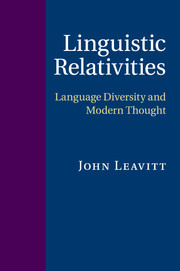Book contents
- Frontmatter
- Contents
- Preface
- Introduction
- 1 A passage to modernity
- 2 One reason, one world, many monads
- 3 The world at war with reason: Britain and France in the eighteenth century
- 4 Multiplicity and the Romantic explosion
- 5 Essences and universals through the nineteenth century
- 6 Boas and the linguistic multiverse
- 7 Linguistic relativity: Sapir, Lee, and Whorf
- 8 The other side of the mirror: a twentieth-century essentialism
- 9 The rise of cognition and the repression of languages
- 10 The return of the repressed
- Conclusion
- Notes
- References
- Index
Conclusion
Published online by Cambridge University Press: 04 April 2011
- Frontmatter
- Contents
- Preface
- Introduction
- 1 A passage to modernity
- 2 One reason, one world, many monads
- 3 The world at war with reason: Britain and France in the eighteenth century
- 4 Multiplicity and the Romantic explosion
- 5 Essences and universals through the nineteenth century
- 6 Boas and the linguistic multiverse
- 7 Linguistic relativity: Sapir, Lee, and Whorf
- 8 The other side of the mirror: a twentieth-century essentialism
- 9 The rise of cognition and the repression of languages
- 10 The return of the repressed
- Conclusion
- Notes
- References
- Index
Summary
Language is the most massive and inclusive art we know.
Edward Sapir (1921: 220)The main purpose of the [proposed] book would be to lead to a freer conception of linguistic phenomena.
Sapir, postscript to a letter to C. K. Ogden, 1923, (cited in Joseph 1996: 382, n. 13)The history we have been following has shown alternating sets of images replacing each other periodically in a swinging of attitudes between wonderment at and denigration of the diversity of languages. Renaissance delight in human diversity and attempts to characterize different types, with a recognition of the troubling complexity of translation, gave way to the universal reason or world of the Enlightenment, for which the human task was everywhere and always to follow chains of reasoning or seek to see the world clear. Here the specifics of different languages could only be distractions or dangers. In turn, using forms Leibniz had explicated to allow an admiration of multiplicity, Herder and the Romantics launched a movement for the liberation of particularity, authenticity, and diversity, seeing Descartes' “chains of reasonings” as chains indeed. The later nineteenth-century admiration for the natural sciences drew attention away once again from languages as specific systems in favor of the search for universal laws of human language or human history. The twentieth century saw the appearance both of a new essentialism in Neohumboldtian linguistics and of what I am arguing is something more complex in Boasian linguistics: an apparently contradictory attempt to refuse to follow either of the available thought-forms and so to offer a way of conceiving language differences that is pluralist but not essentialist.
- Type
- Chapter
- Information
- Linguistic RelativitiesLanguage Diversity and Modern Thought, pp. 212 - 216Publisher: Cambridge University PressPrint publication year: 2010



